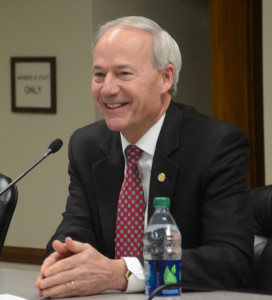By Steve Brawner
© 2015 by Steve Brawner Communications, Inc.
Being governor is not a job where practice makes perfect. In fact, in many ways, a governor is at his or her best as a beginner.
A new governor is fresh off the victory speech and is running off the adrenaline from the transition to power. He has a new title that carries with it an air of authority. He has ideas he can’t wait to implement. He hasn’t grown cynical from lost battles or grown paranoid from all the criticism. He’s younger than he’ll ever be again.
Circumstances can serve to magnify those early advantages. Gov. Asa Hutchinson came into office as the first Republican governor with a Republican Legislature since shortly after the Civil War. His predecessor, Gov. Mike Beebe, entered office after a landslide victory (over Hutchinson). Beebe’s predecessor, Gov. Mike Huckabee, became governor after demonstrating firm leadership amidst Gov. Jim Guy Tucker’s last-minute indecision about resigning.
Some of Huckabee’s and Beebe’s most notable policy accomplishments came early in their administrations. For Huckabee, it was ARKids First and the conservation tax. In his first session, Beebe and the Legislature increased school funding and cut the grocery tax in half.
They both were fine governors, but as would be the case with anyone, we’re better off that the Arkansas Constitution ensures we get some fresh blood in there after a while.
A good example of this is prison reform. This was not a focus of Hutchinson’s during the campaign, but it has become one now, and it may be the issue that most defines him when it’s all said and done. The state’s prisons are currently so overcapacity that 2,500 inmates are being housed in county jails. However, the state can’t afford to keep building cells, and simply letting inmates out of jail isn’t the best solution because many have a drug or alcohol problem, and 43 percent return to prison soon after being released. The only long-term solution, Hutchinson said, is to change inmates’ behavior, so his prison reform plan would create transitional centers to help parolees re-enter society.
Hutchinson was his usual reserved self when announcing his plans, but there was a fire in his eyes that I suspect won’t quite be there seven years from now. Again, fresh blood is a good thing.
Which brings us to highways. Last Feb. 19, Scott Bennett, director of the Arkansas Highway and Transportation Department, testified before a House panel in favor of House Bill 1346 by Rep. Dan Douglas, R-Bentonville, which would dedicate for highways sales tax revenues from the purchases of new and used cars and car parts.
Bennett has given this presentation so many times that he probably could do it in his sleep. The state has $20.3 billion in highway needs over the next 10 years but only $3.6 billion in expected revenues. While construction costs are rising, the primary means of funding highways, federal and state motor fuels taxes, have not been increased for decades and are producing less revenue because cars are becoming more fuel efficient. Yes, Arkansas voters passed an interstate bond issue in 2011 and a half-cent sales tax for highways in 2012. Together, those will affect less than 4 percent of the state’s roadways.
Bennett has been in his position long enough that the fire in his eyes that day was accompanied by a hint of desperation and frustration in his voice. Two years ago, a similar bill started out with broad support, but it failed under opposition from competing interests who feared highways would take a bigger slice of their pie. Gov. Beebe was adamantly opposed, and it failed.
Douglas’ bill did pass out of the committee, but, near the end of the meeting, Hutchinson’s Department of Finance and Administration director, Larry Walther, testified against it, saying it would create holes in the state budget. That was an ominous sign for the bill’s supporters: It meant Hutchinson is opposed. Highways at this point are not his thing – not at the expense of other things, anyway. This week, Douglas announced that, because of the governor’s opposition, he was putting the bill on hold for a while.
The funding model for highways is not sustainable, at the state or national levels. Highways and bridges that aren’t properly maintained now will have to be replaced later, at much higher costs.
How soon the problem is addressed matters. A lot more gets done when there’s fresh blood in the Governor’s Mansion and the governor still has fire in his eyes.
